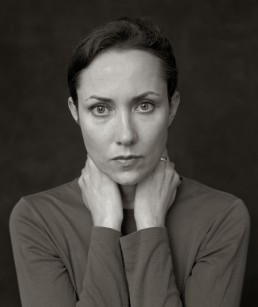S1: Episode 24 - Natalie Watkins Part One

Episode Information
[Intro Music]
Narrator: Welcome to My Heart is Not Blind. Narrative histories about blindness and perception. A traveling exhibition and book published by Trinity University Press, supported by Kronkosky Charitable Foundation, edited and hosted by Michael Nye. Stories are often found, resting along the edges of surprise and revelation. Every person, every place is a map to somewhere else. Episode 24, Natalie Watkins, part one.
Natalie: My entire childhood was very visual and my memories are visual memories. My favorite experiences were when I lived on a island in the Pacific called Guam. I remember lots of salty air and a beautiful vast turquoise ocean just appreciating the beauty of the rainforest there. It was just some of the happiest years of my childhood. My grandmother was blind. She could see shadows. She couldn’t see faces. I remember she could dress herself and brush her teeth and take a shower, those types of things. I remember one time in particular, I was nine years old, and I asked her if I could do her makeup, and then I started being silly and I drew like a star on her forehead, and then I felt guilty for doing it.
I remember as a child at nighttime really struggling and seeing my friends who, while trick-or-treating, could run ahead, and I was always tripping over sprinkler heads, and they were able to dart just effortlessly through the night. I remember having those experiences and feeling like there was something about me that was different, but not giving it any more thought than that. My parents told me they were taking me to get my eyes checked. We went to the doctor and they did a test called an electroretinogram. The the doctor was very young. He looked profoundly sad. He sat down in a small room with my dad and me, and delivered the news that I did test positive for retinitis pigmentosa. Well, I, I do remember leaving and feeling devastated, and I cried the entire way home. To me it felt like my future was bleak. I heard, uh, retinitis pigmentosa the first time when I asked my mom why my aunts and my grandmother couldn’t see, which I thought was almost a laughable word. It’s so long and Latin and clunky. First one experiences, night blindness, then peripheral loss, and finally, central vision loss.
Uh, after diagnosis, I thought that I would kill myself if I went blind. In fact, I remember making that statement to my uncle. We were driving in the car and I was 17 years old, and then I said, I’ll kill myself if I go blind. But then I got married and I have kids, and I have friends and parents who are living, and so one has to adapt and cope with daily life. Well, I love my vision. I love what it is that I can see. I’ve lost most of my peripheral vision, and I’m desperately holding on to my central vision. It’s a very small tunnel. I absolutely feel like I’m in between two worlds. I don’t really have full membership into either one. My, my husband has been great because I spent so much money and so much time, and it would be really easy to turn around and blame me.
I tried acupuncture. I tried stem cell implants. I tried microcurrent stimulation, and that’s not to count the time that I was hospitalized from all of my . Lack of sleep and obsessive search for answers. Well, I’ve lost my ability to read standard print. I’ve lost my ability to walk independently. No matter how well things are going in life, there’s this constant monster of blindness. It’s very frightening, terrifying. That’s how, that’s how I feel about blindness. You know, I think all of us have vulnerabilities and weaknesses. I mean, any of us could go blind anytime. Any of us can be hungry. Any of us can be homeless. Any of us could be a prostitute under the right circumstances that, that we’re no better than any of our fellow human beings. And it’s made me more H don’t look at other people as being less than because I realize how much that stings. I do love vision. I, I love being able to relate to the visual world along with everyone else. To fully participate in that and be a part of that is a blessing. No , no. I don’t wanna lose my vision. Definitely not. If I have to, I will, and I’ll find a way to cope and maybe even find happiness, but I’m not at that point yet.
[Outro Music]
Host: Natalie Watkins is a passionate risk taker, deeply curious on her website, NatalieWatkinsWriter.com. She says, “I’m deeply intrigued by the stories of others and the possibility of literature to engender empathy.” Natalie’s diverse professional identities are many. She said, “It was necessary to pivot careers as my vision declined.” She was a model she taught in public school, personal finance counselor, licensed stockbroker. Natalie has served as an advocate in many capacities. She’s a writer, married with two children. Her perspective about family, friendships, education, fear, living, and the meaning of vision loss and vision found is 300 miles long. Each of the many times we visited, I came away uplifted.
Join us next week. Two new episodes will be released. Please subscribe, rate, and review this podcast. You can also go to my website, michaelnye.org/podcast. For portraits and transcripts, thank you for listening.
